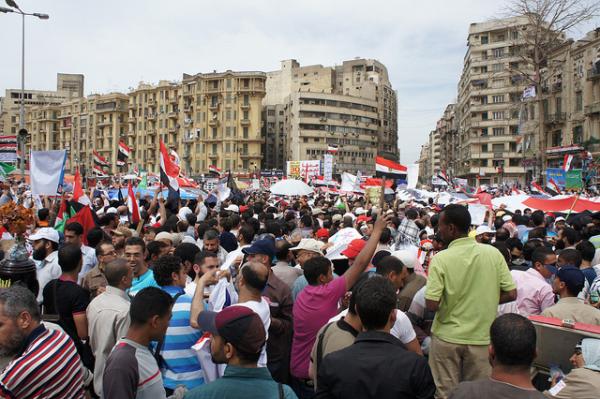Egypt’s second revolution

As massive protests swept across Egypt on Sunday, many outside of Egypt were surprised to see the sheer volumes of people that were unhappy with President Mohamed Morsi and his government, so soon after the revolution.
Protesters flooded Tahrir Square with an endless sea of Egyptian flags. They chanted “Irhal,” meaning “leave” or “get out,” calling for the resignation of Morsi and early national elections. Initial news reports said the number of protesters was in the tens of thousands. As time went on, the number shot into the millions, surpassing the number of protesters that triggered Egypt’s historical revolution in 2011 and toppled Hosni Mubarak.
The latest figures state that approximately 17 million people protested all over Egypt. If these numbers are true, Sunday’s protest is the largest in human history.
Opposition to Morsi has not sparked up suddenly. The “Tamarud” (“rebellion”) movement, has been building over the last few months, first antagonized by the first democratic elections, which some believe were rigged. Menna Labib, a student, says, “I do have faith in the democratic system, but we have to be careful in Egypt because every single election we have ever had has been rigged”.
She supported the revolution against Mubarak but has opposed the Muslim Brotherhood from the start. “I was against Morsi then because I do not think that religion should be mixed with politics, especially not the way the Brotherhood was doing it. I would rather Egypt be a civilian state that allows for the peaceful coexistence of people of different beliefs than for Islam’s name to be tarnished by a group of extremists who are power hungry.”
Other Egyptians, however, did support the Muslim Brotherhood, in spite of accusations of rigged elections. Their campaign, after all, appeared to be inclusive, promising prosperity and convincing many, including the West, that the Muslim Brotherhood would not focus solely on promoting an Islamist agenda. With time, however, it became apparent that this moderate stance was a mere campaign strategy. Soon after the Muslim Brotherhood came to power, laws started to become more Islamic and policies more extremist. Sameh William, aged 29, says that the inclusion of religion in politics has been used to brainwash many, “especially in Egypt where people get very emotional about their religion.” Menna Labib agrees, stating that it was easy for the Brotherhood to manipulate the mass population of the poor in Egypt, many of whom are illiterate, by using Islam and promises of redemption, as well as distributing meat, sugar and oil at their political rallies. However, religious political policy is only one of the many problems raised by protesters over the past two days. Most other issues have related to political and economic instability. The murder rate, kidnapping rate, unemployment, and poverty as a whole have seen dramatic increases, and numerous electricity cuts, fuel shortages and a bread crisis (the staple food of Egypt) have plagued the country.
Given that the Muslim Brotherhood came to power through a democratic process, another ousting of a president could threaten the democratic system as a whole. However, the people protesting—Muslims and Christians alike—do not see it that way. To them, the Muslim Brotherhood has broken its promise for a fair and open democratic system and therefore, the revolution is incomplete. After the election, President Morsi took various steps, including decreeing a new Constitution and removing the Attorney General (an act that was previously unconstitutional), towards making his power unlimited.
Sameh William was unhappy that the body that could make recommendations for the constitution was not representative of the population as there were no Christian representatives. He also stated that the Constitution allowed the President to be the highest authority, except for the Parliament which had not been elected yet. “This meant that until the Parliament was elected he was basically a dictator.” He remarks that after the Constitution was decreed, thousands went to protest against it but were ignored by the President. “After few days of protests, the number of people in the streets started decreasing so the president’s supporters seized the opportunity and they attacked the people still in the street, it was something like a civil war and resulted in 9 dead and 446 injured.” This could be a potential reality in the coming days in Egypt if crowds become more militant.
As it stands presently, the military has given the president a 48 hour ultimatum: meet the demands of the people or face military intervention. Millions stand in the streets, either anticipating the resignation of President Morsi or protesting in support of him. Of those who remain behind the Muslim Brotherhood, some have been quoted threatening to topple the next president if Morsi is ousted. While some violent clashes have broken out between the two sides of supporters, a much darker possibility looms—the chance an outcome against the Brotherhood could end in civil war.
Fawzy is an Ndifuna Ukwazi Fellow and social justice activist. She is from Egypt. Her twitter handle is @marybfawzy.
Next: Labelling Israeli injustice
Previous: Go beyond lawyers for new judges

This article is licensed under a Creative Commons Attribution-NoDerivatives 4.0 International License.


